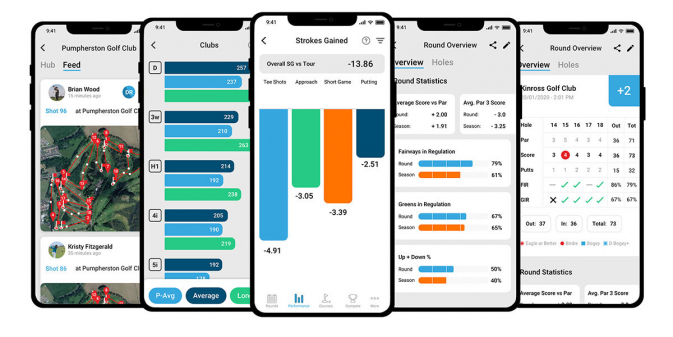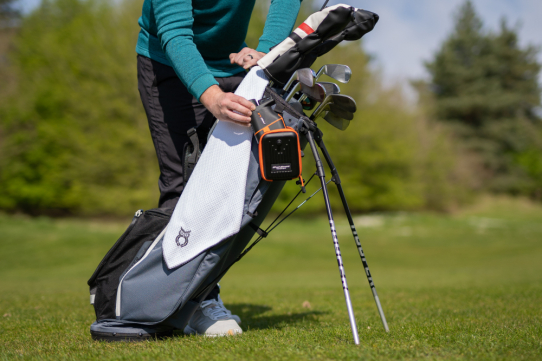Emersum S.r.l.
Rome RM
Italy

Rome RM
Italy
Piazzale Aldo Moro 5
00185 Rome RM
Italy
Via Edoardo d'Onofrio, 304
00155 Roma RM
Italy

Founded in 2015, Shot Scope specialises in providing wearable GNSS and automatic performance tracking technology solutions to the worldwide golfing market. By utilising a combination of GNSS signals and satellite imagery, Shot Scope products now help golfers review their game quickly and easily, and improve their performance by gaining insights into how they play on each course and learning how to choose the most appropriate club for each hole.
During the Demonstration Project, which started in 2020, Shot Scope engineers developed software to deliver six new features to users of the Shot Scope mobile application. These were tested and trialled, with four of the six then further refined and launched to users across 120 countries. The company’s user base has grown from 20,000 before the project started to over 85,000.

The project trials involved a UK golf retailer, a USA-based golf equipment manufacturer and over 500 beta Shot Scope users. In total, the technology developed during the Golf Data Intellect project was tested by over 7,500 golfers playing over 30,000 rounds of golf.
Shot Scope has a database of 40,000 golf courses mapped metre by metre using the company’s proprietary course mapping software. In addition, the patented technology in Shot Scope’s wearable devices includes an RFID antenna. Together, this means that by using GNSS data, the exact position of a golfer, the shot played, or the layout of the course can be provided on a wearable or handheld device.
As a result of the project, which was co-funded by ESA, Shot Scope’s devices now provide a range of on-course data. This includes: overhead views of every hole, detailing every shot; personal statistics, analytics and performance insights; heat maps; and interactive graphs, charts and tables that relate to a round, season or custom events as set by the user.
“I’m pleased to see the success of Shot Scope: this is a great example of the potential of space to drive commercial solutions within the sports industry“ says Elena Razzano, Business Applications Officer at ESA Space Solutions.
Among the future commercial developments are a coaching platform and a data platform. Shot Scope has started working with college coaches in the USA to further refine the coaching platform ahead of its commercial launch in 2023, and aims to partner initially with at least 25 USA-based college golf teams. The launch will be in partnership with a global telecoms leader.
In parallel, Shot Scope is working with a retailer in Europe on further development of the data platform, with a roadmap of 18 to 24 months for commercial launch of the platform. Another partnership will see it work with a distributor in Japan.

The four-fold growth in the number of users during the 18 months of the project has been matched with a 400% increase in revenue. The company is now seeking to recruit four new software developers and expand its the commercial team. The number of daily rounds recorded on Shot Scope has also increased by a factor of four to an average daily round count of over 10,000 rounds, with the company forecasting this will grow to over 50,000 daily by the end of 2023.
David Hunter, CEO of Shot Scope said: “ESA’s support in the Golf Data Intellect project has allowed us to expand and grow our software development team, which in turn has enabled us to accelerate the development of game-changing features for the golf market. This in turn will help us expand internationally.”
Hesselink van Suchtelenweg 6
6703 CT Wageningen
Netherlands
The thematic call “Satellite Connectivity for Autonomous land vehicles safety” aims to foster the development and showcase of innovative applications for the safe and secure deployment and management of autonomous and connected land vehicles by integrating satellite communications and other space assets with terrestrial and digital technologies.
The United Nations Satellite Centre (UNOSAT) launched its Humanitarian Rapid Mapping service in 2003, using satellite imagery to monitor natural disasters such as earthquakes, forest fires and floods. The intention was to use satellite images to direct first responders and medical teams to where they were required. These early satellite images were provided as PDFs which, while useful, could not be easily updated.
Meanwhile in Norway, a small tech company, AnsuR, had launched ASIGN, an application which could operate via satellite and mobile phone technology using very low bandwith, ideal for when networks fail in the aftermath of a disaster. UNOSAT realised that ASIGN, if run on smartphones, could help them amend their satellite images in real time, so teams on the ground had a constantly updating, georeferenced resource. Live, online maps were a huge boon to disaster relief and, as a consequence, AnsuR won ESA’s App challenge, part of the Copernicus Masters competition for global innovation, in 2012.
Subsequently, working with UNOSAT and ESA Space Solutions, ASIGN was developed further. A pilot demonstration in South-East Asia – an area exposed to more natural disasters than any other part of the world – led to the launch of B-SURE or “Benefiting from Space for Urban Disaster and Resilience Excellence”.
B-SURE’s main objective is to further minimise disaster response time. Bandwidth usage has been reduced even further, by up to 99 per cent, saving time while data is transferred. It is particularly suited for disaster and emergency management because if no local mobile network is available, it can use satellite channels instead. First responders can communicate efficiently whatever the situation.
“AnsuR has been dedicated to apply our innovation in mission-critical communication to humanitarian operations, and in particular with the UN and UNOSAT, almost since we were founded. With B-SURE we have managed to develop several new technical capabilities that provide new services that in term help UN operations become more effective. Working with UN provides us with a chance to test and validate our solutions in tough situations. In turn, this also gives us credibility when working with other user groups. Solving these kind of substantial challenges with the UN is also highly motivating for our team to work with,” said Dr Harald Skinnemoen, Founder of AnsuR.
Information managers interact with users in the field using online web browsers on secure servers, with information sent directly to the responders’ smartphones. The managers can study data from Earth observation satellites, locally based drones and video taken at the scene, and select high-resolution images where they are required, enhancing field operatives’ knowledge on the spot. Satcom information can be used to direct them to where they are most urgently required.
The Unmanned Aerial Vehicle (UAV) version of the software allows remote viewers to directly access camera footage from drones flying over the disaster scene, while video conferencing between managers and teams on-site is also an option. Individual members of the public affected by the situation can also contribute by uploading photographs or video they have taken. ASIGN prioritises the network capacity of content it considers most relevant and filters incoming data.
The COVID pandemic halted development of the programme briefly but B-SURE has since been used to direct the response to the 2021 floods in Germany, and UN peacekeeping forces have issued a tender for procuring the system. The system is installed with the UN at the CERN campus, where the World Wide Web was invented. Using the world's first web-domain (cern.ch) The UN OCHA (INSARAG) has adopted the system to direct response teams during emergencies. The Oslo Police have also installed the system on own servers for security use cases.
“UNOSAT has supported AnsuR in the B-SURE project because the technology developed supports several of our sustainable development goals, such as Goal 9 for innovation and building resilient infrastructure, Goal 11 for building more resilient cities able to cope with disasters, Goal 13 in handling natural disasters that are effects of climate change and Goal 17 in creating partnerships for achieving the goals,” said Einar Bjørgo, Director at UNOSAT. “UNOSAT and AnsuR has a long relationship spanning more than a decade. The highly successful results of the B-SURE project, proven on multiple occasions in the field, allow the UN to provide new and more innovative satellite-based solutions that ultimately help UNOSAT provide better services to the UN and to the world in general.”
Schools have always played the role of catalysts of innovation and creativity. They are the place where students explore, often for the first time, new technologies and advanced solutions. The advantage of technologies and innovation in the education sector is twofold: students are accompanied and prepared to enter the world of work, and they also become an essential tool for enhancing the quality of teaching and the learning process, especially in extraordinary circumstances, such as the recent COVID-19 pandemic.